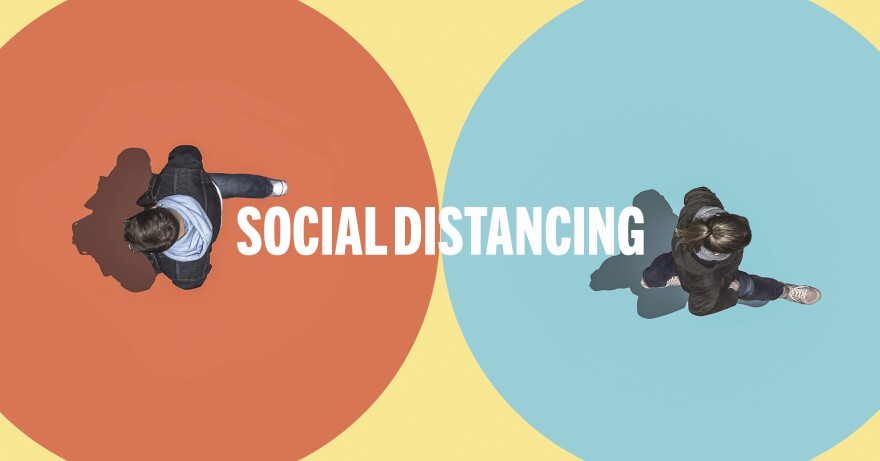Eighteen-year-old Lucy Smithwick recently sat in a room she’s all too familiar with. It’s her bedroom in her childhood home in Charlotte.
Not too long ago, she said goodbye to it and everything else in her childhood life when she prepared for her first year at UNC Chapel Hill.

"I said goodbye to my cats a lot, " Smithwick said with a smile. "That was the biggest thing. It was definitely weird saying goodbye and then coming back two weeks later."
There is one new addition to her room that hangs behind her -- a quirky shower curtain that’s now her backdrop on Zoom calls. The curtain, which she describes as the highlight of her dorm, has a velociraptor riding an old-timey bicycle with a top hat and mustache — and a monocle as well.
It's a memento of her brief, in-person college experience.
Because of the COVID-19 clusters that quickly popped up on UNC Chapel Hill's campus, Smithwick's first semester of college was more like a short trip — a brief taste of freedom she calls it. Now all of her classes are remote, and at the time of this interview, she was back at home.
"A lot of people on campus had been saying, 'That was such a fun summer camp experience, best summer camp experience I’ve had!' And honestly that’s completely what it felt like," she said.
Those two weeks in person were actually pretty good, albeit atypical of what she always pictured college to be like. She didn't go to any parties or attend big lectures. She didn’t even get to eat in a dining hall. Her in-person classes quickly turned virtual.
She bonded instantly with her suitemates and roommate, and they made a pact that they hoped would keep each other safe and healthy while keeping their newly found college freedom for as long as possible.
Some of the ground rules they had all agreed to, according to Smithwick: "Let's not eat inside anywhere if possible, either do take-out or sit outside. Please don't hang out with anyone unmasked or closer than 6 feet. Obviously don’t go to any parties. Sanitize the doorknobs every night, sanitize whenever we come back back in the suite. Stuff like that to say, ‘OK, we are not going to get this,' is how we are going to keep from getting it.’"
They even swore off using the dorm elevator to limit exposure with people outside of their suite.
"We were on the fourth floor so it wasn't too bad," she said. "We got exercise every time we wanted to go up and down, it was mainly two trips daily. We weren’t really leaving the room after that, anyway."
Despite Smithwick and her suitemate’s efforts, COVID-19 numbers continued to rise in Chapel Hill. And it was frustrating. She saw the videos circulating of college parties that made national headlines.
The pandemic has been like the worst group project assignment: You can do your part, but if someone doesn’t turn in their share, it just doesn’t matter.
Only the stakes, are much higher.
"We weren’t their main concern when they were partying," Smithwick said. "It was just, 'Seriously, come on! You know we are in the middle of a pandemic, are you really just going to be that selfish?'"
Then there was how the university handled the start of the semester in the first place. The school’s student newspaper, The Daily Tar Heel, received national attention for its coverage of the university’s whiplash decision to bring students back to campus only to send them home when the school witnessed outbreaks of the virus.
Smithwick's eyes light up and there’s a lot of pride in her voice when she talks about The Daily Tar Heel. She’s studying journalism and recently joined the paper. She had her first byline in September. She’s learning to tap into her passions like journalism from a virtual space — versus the physical newsroom she thought she’d be in.
"Right now is the perfect time to be able to tell people’s stories with the Black Lives Matter movement and the elections," she said. "I think it is the prime time for a journalist student to be in a journalist community. I think that UNC journalism specifically is handling it very well."
This first college semester is all about shifting expectations into a new reality, but also remembering to get creative. She talked it over with her roommate she had clicked so well during those two weeks on campus. And since this interview, they decided to pack up and head to the beach — not for a college party, but to attend classes virtually just from a different space — her roommate’s family beach house.
To try and get a little bit of that freedom back.
WFAE wants to hear from you if you have a story about the challenges and changes you’ve experienced since the outbreak of the coronavirus leave us a voicemail at 704-916-9114. Or go to wfae.org for more information and we hope you and your loved ones are taking care.
Sign up here for The Frequency, WFAE’s daily email newsletter.
What questions do you have about the coronavirus? What has this experience been like for you? Share your questions below.
_






